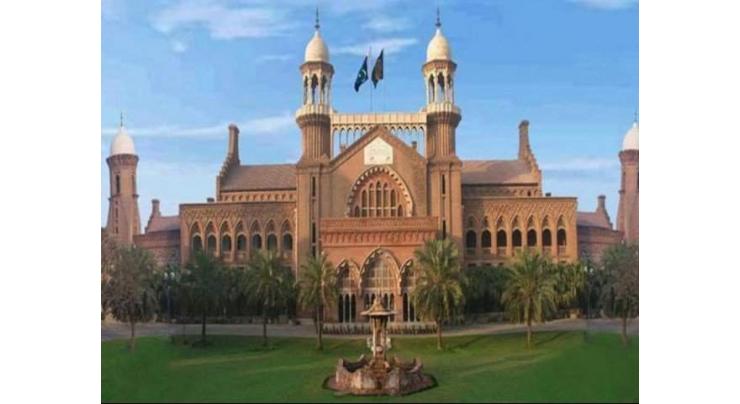
LHC Stops OMT Construction Within 200 Ft Of 11 Historical Sites
Mohammad Ali (@ChaudhryMAli88) Published August 19, 2016 | 03:49 PM

LAHORE, (UrduPoint / Pakistan Point News - 19th Augst,2016) A Lahore High Court (LHC) division bench, Friday partly allowing petitions, challenging the construction of Orange Line Metro Train (OMT) project around protected heritage sites in the city, stopped respondents from carrying out any constructions within 200 feet of the sites. The bench also set aside original, revised and amended "No objections certificates" (NOCs) issued by the authorities concerned for the purpose. The bench comprising Justice Abid Aziz Sheikh and Justice Shahid Karim announced the verdict which had been reserved after Punjab Advocate General Shakeelur Rehman, bench appointed amicus curiae (friend of the court), and Supreme Court Bar Association President Barrister Ali Zafar, and petitioners' counsel concluded their arguments on July 13. However, in its 83-page detailed judgement, the bench directed the Director General Archaeology to engage independent consultants including experts of international level and carry out fresh independent study regarding protected and historical places, in consultation with the UNESCO preferably. The court held that request for permission would be considered afresh by the competent authorities in the light of the study. The bench further directed government to frame rules under Section 37 of the Antiquities Act of 1975 and Section 16 of Punjab Special Premises Preservation Ordinance of 1985 to structure the discretion of competent authorities for future permissions under section 22 of the Act of 1975 and section 11 of ordinance of 1985. The bench dismissed petitions to the extent of environmental approvals dated July 9, 2015 and March 9, 2016, being non-maintainable. However, the bench ordered authorities concerned to implement recommendations of advisory committee on Environment in letter and spirit, besides disposing of all pending connected applications of the parties. Civil society members and organisations including Kamil Khan Mumtaz, and others had moved these petitions. The proceedings on these petitions commenced in November 2015.
On January 28, the bench had stayed the construction of OMT at eleven historical monuments including Lakshmi Building, Shalimar Garden, General Post Office, Aiwan e Auqaf, Shah Charagh Building, Supreme Court Lahore Registry, Saint Andrew Church, Baba Mauj Darya's Shrine, Ghulabi Bagh, Bhudu ka Awa, Chauburji and tomb of Zebun Nisa.
Earlier, the advocate general Punjab in his arguments submitted that OMT was a public welfare project and petitioners should not be allowed to cause hurdles in its completion.
He said the government tried its best to protect environment and historical monuments and there would be no danger for the public at large. He said the project was initiated after hearing all public objections and people, whose lands were acquired for this project, were compensated according to the market value.
He said the government had already spent huge amount of money to lay down the foundation of this project and it should not be stopped. Amicus curiae Barrister Ali Zafar said it was the right of government to construct and develop public infrastructure in the city to meet the demands of people.
He said the court must refrain from stopping the government from planning, expansion and developing infrastructure, as it was an established fact that the courts do not interfere in policy matters. However, he submitted that the development must always be sustainable and whenever the government undertakes an urban planning project it must ensure that the project does not harm any protected site.
Relying on the Antiquities Act, 1975, he submitted that this law specifies that all monuments, objects and sites of historical interest were protected from any damage and as such imposes a positive duty on the government while at the same time prohibits it from allowing any construction within 200 feet of the monument.
. Petitioners' counsel Muhammad Azhar Siddique had claimed that this project was waste of money and it would physically destroy the heritage of this historical city, requesting the court to declare this project a violation of Articles 9, 10-A, 14, 23, 24, 25 and 28 of the Constitution of Pakistan.
Related Topics
Recent Stories

Currency Rate In Pakistan - Dollar, Euro, Pound, Riyal Rates On 26 April 2024

Today Gold Rate in Pakistan 26 April 2024

ICC Womens T20 World Cup Qualifier, Match 2: Ireland Women open with Comfortable ..

Robinson, bowlers help New Zealand go 2-1 up against Pakistan

Shahzeb Chachar to hold khuli kachehri on April 26

Heatwave amid Israel's aggression in Gaza brings new misery, disease risk

Tourism must change, mayor says as Venice launches entry fee

Court adjourns Judicial Complex attack case till May 17

Nasreen Noori’s book ‘Popatan Jahra Khwab’ launched

Wafaqi Mohtasib inspection team visits Excise and taxation office

AJLAC announces 5th Conference titled ‘People’s Mandate: Safeguarding Civil ..

Pak-US officials engage to enhance trade, investment ties
More Stories From Pakistan
-
Naval Chief participates in 19th Western Pacific Naval Symposium in China
10 hours ago -
Int'l symposium addresses capacity building for safe, environmentally sound ship recycling in Pakist ..
11 hours ago -

Shahzeb Chachar to hold khuli kachehri on April 26
11 hours ago -

Court adjourns Judicial Complex attack case till May 17
11 hours ago -

Nasreen Noori’s book ‘Popatan Jahra Khwab’ launched
11 hours ago -

Wafaqi Mohtasib inspection team visits Excise and taxation office
11 hours ago
-

AJLAC announces 5th Conference titled ‘People’s Mandate: Safeguarding Civil Rights in South Asia ..
12 hours ago -

IBCC to promote educational excellence, expand regional presence
12 hours ago -

Pakistan embassy organizes scholarship award ceremony in Kathmandu
12 hours ago -

SC to hear case pertaining IHC judges' letter on April 30
12 hours ago -

SC orders removal of barriers outside buildings in Karachi
12 hours ago -

PFA launches crackdown, impose fine for selling expired drinks, food items
12 hours ago









